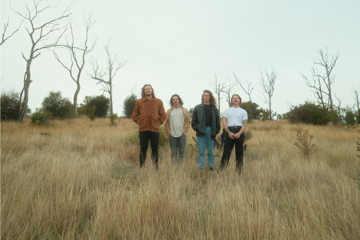Slash Ft Myles Kennedy & The Conspirators On Being Rockstars And Workaholics
As Slash Ft Myles Kennedy & The Conspirators crank their rock'n'roll machine into gear again, Brendan Crabb talks to singer Myles Kennedy about being a workaholic.

Rather than recuperate from and celebrate the mega-grossing, world-conquering Guns N' Roses reunion jaunt, axeman Slash has instead reconvened his solo rock band, Myles Kennedy & The Conspirators for another go-around. New record Living The Dream is his third full-length featuring the Conspirators, which includes Alter Bridge vocalist Kennedy, Brent Fitz (drums), Todd Kerns (bass/vocals) and Frank Sidoris (guitar/vocals).
Kennedy says there had been the discussion of doing another Slash record "for quite a while, but it was really just a matter of finding that window of time". However, the point remains that most musicians who have enjoyed the luxury of such a lucrative tour surely wouldn't feel compelled to engage in other projects quite so soon. Is that testament to Slash's work ethic? "Yeah, I think that highlights [how] he lives to play. I don't think that I've met too many people in all the years that I've been doing this who have the amount, the need to perform and create that he does. I think that it's definitely inspiring, and to me, it highlights that this is a person who's truly following their bliss, and has found…he knows what he was put on this planet to do, and I don't think he takes that lightly."
"So I think that's a testament to Slash's, not just work ethic, but just his love for music. It's always been the kind of working relationship where I think we just understand each other, which is healthy. I think we both recognise that we're both workaholics, we just love playing music. I think that's part of why that works."
Rock's perennial nice guy is speaking from his home in Spokane, Washington, taking a break from playing guitar to tackle press duties. Although his prowess on that instrument has been a key element of The Conspirators' sonic palette on both Living The Dream and predecessor World On Fire, Kennedy concentrated on lead vocal and lyrical duties. "It doesn't necessarily have a common theme that runs throughout, but some of the songs are from personal experiences," he says of the new Slash material. "We have a song called The One You Loved Is Gone, which a lot of people think is about lost romance with a human, but it's actually about a dog that I had about 20 years ago," he laughs. "So that was one that came from more personal experiences."
That said, Living The Dream's storytelling doesn't delve into the deeply personal depths of Kennedy's recent solo effort, Year Of The Tiger — a soul-baring exercise exploring a family tragedy from his childhood. Namely, his father's death. "It's definitely so different from what I did on the solo record. I think initially it was kind of a shift in gears for me, after being so personal…It wasn't like this cathartic process that I went through with Year Of The Tiger. But it definitely was a welcome change because it gave me the opportunity to step away from something that was so heavy in that respect and tell some different kinds of stories. In the end, I think it was a good thing for me."
As Slash, Kennedy and company prepare to hit the road and perform a clutch of these new songs on the world's arena and festival stages, the set-lists are sure to also incorporate liberal amounts of material from the guitar legend's assorted ventures, including Guns N' Roses and Velvet Revolver.
Don't miss a beat with our FREE daily newsletter
"It's interesting because that was one of the big challenges when I first took this on," Kennedy remarks of inhabiting and connecting with the themes of those tracks. "I think doing it helped me as a singer and as a performer; it was just a learning experience in a lot of ways. So what I would try to do is, to a degree get inside the song, understand what the song is about. There are some songs in the catalogue we do where the lyrics might be ambiguous enough to where I wasn't sure what the story-line actually was, especially with some of those Velvet Revolver songs. Scott's [Weiland] approach as a lyricist was he would paint very abstract pictures with his lyrics. So it became a matter of me trying to fill in the blanks myself, and make sure that as I was singing it that I was connecting to something that I could emote. That's part of the challenge sometimes with things like that."







